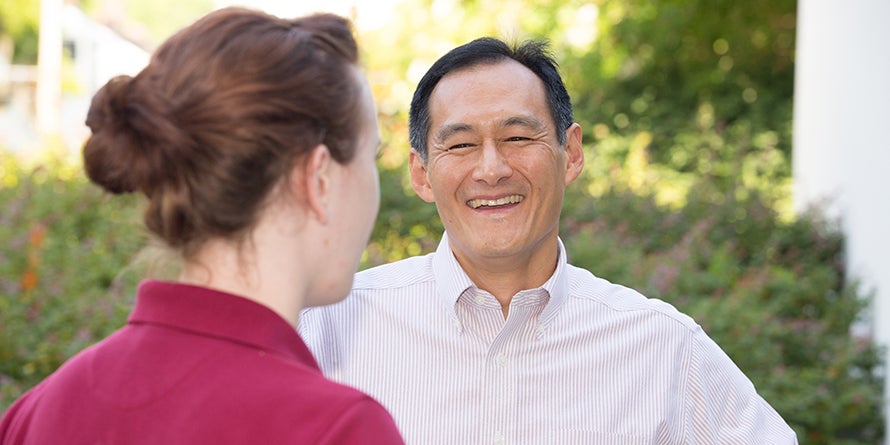
Q&A with Professor Shi-Ling Hsu
What made you decide to become a law professor?
It was actually an accident! I was in Washington, D.C., fresh off my Ph.D. in Agricultural and Resource Economics, working for an environmental think tank, and I was preparing to search for a teaching job in Environmental Economics or Environmental Policy. The AALS law professors’ recruitment meeting is always in Washington, D.C., so on a whim, I put in my resume and paid the $200 fee. I wound up with over a dozen interviews, seven call-back campus interviews, and I was off to the races. I left legal practice to pursue economics because I became convinced that lawyers don't have all the answers when it comes to protecting the environment. Now, I could actually put that to work where it was most needed, in a law school.
For people who don’t know, could you explain your area of expertise and why you chose to specialize in that area?
Over my post-doctorate career, I've researched and written in the cross-section of law, economics and ecology (I have a master's degree in that as well). I've always tried to introduce to my students and my environmental law colleagues throughout the academy that economics has some very important insights to offer when it comes to protecting the environment. I believe that the environment is a fundamental part of our economy, not just a dumping ground for byproducts. The environment has enormous economic value; we just don't price it.
Can you give me a broad overview of your scholarship?
My work is oriented towards introducing economic rationales for environmental protection, both for motivating it and for designing it. Some of my work makes the case for cost-benefit analysis. I don't believe that doing cost-benefit analysis means we will systematically reduce regulation. Far from it. If we only thought a little bit about the health benefits of regulation, for example, I think we might actually see more of it.
More recently, my attention has turned to climate change. This is an existential threat to human civilization. I wrote a book, The Case for a Carbon Tax, in 2011, and plan to write a follow-up this year. I have written other pieces on economic justifications and policy design issues for reducing greenhouse gas emissions.
Why did you want to come to Florida State to be a part of our environmental law program?
I left a very content life and a comfortable position to join a faculty that is deeply respected throughout the legal academy. At some point, a scholar wants to know exactly how good they can be, and I felt that my future colleagues at Florida State would push me to be that better scholar. I have not been disappointed. My colleagues test me continuously, and it has made me stronger.
How would you describe the atmosphere at the law school compared to other places you have taught/studied?
FSU Law is quite special – it really is a very challenging place, while being a very supportive place. Students, faculty and administration members have all placed a high priority on everybody's success. It ought to be more common than it is, but I am glad that FSU Law is one of those places where an institutionalized culture recognizes that the institution succeeds when the individual thrives.
If you had not entered law teaching, what do you think you would have done with your career?
I would be teaching economics to high school students. In fact, I still think about it. Our society is abysmally economically illiterate. When politicians spout nonsensical things about complicated economic problems, it is demonstrably detrimental to economic policy. Part of the reason that they can get away with making blatantly untrue economic assertions is because our broader polity does not have the education to challenge them. Economic discourse in this country (and indeed worldwide) needs a crash course, and high school is the place to start.
Can you tell me a little about your family?
My wife is an environmental scientist, so we have lots to talk about. Not that we do, because we are usually spending what feels like an inordinate amount of time doting on our 11-year-old daughter and 8-year-old son. My wife and I are constantly tired, but extremely proud of our two kids.
What accomplishment are you most proud of? Why?
I've run 22 marathons, including the Boston Marathon six times. I'm proud because completing a marathon does not require good genes, but diligence. You must show up, every day, and do what you set out to do. Even speeding yourself up to run fast enough to qualify for Boston can be done, if you just diligently keep to your program. Running a marathon, and training for it requires diligence. Nothing else. I'm proud that I could stay diligent enough to complete the training.
Is there anything additional alums should know about you?
My dad, Pa Ho Hsu, got a chance as an immigrant in the United States because a professor at Virginia Tech, Charles I. Rich, took a chance on him and gave him a full-tuition scholarship and graduate stipend to study soil chemistry. Professor Rich also helped my dad open a bank account, shop for groceries, and adjust to life in the United States. My dad became a professor and taught at Rutgers University for 30 years. Among his three sons, two became professors and one became a Silicon Valley startup entrepreneur. Among his grandchildren, one was an early employee of Facebook and helped recruit much of its current workforce. Another is a professor at M.I.T. None of this happens unless my dad is given a chance, and someone like Professor Rich sees him through.
As printed in the 2017 issue of Florida State Law magazine.

